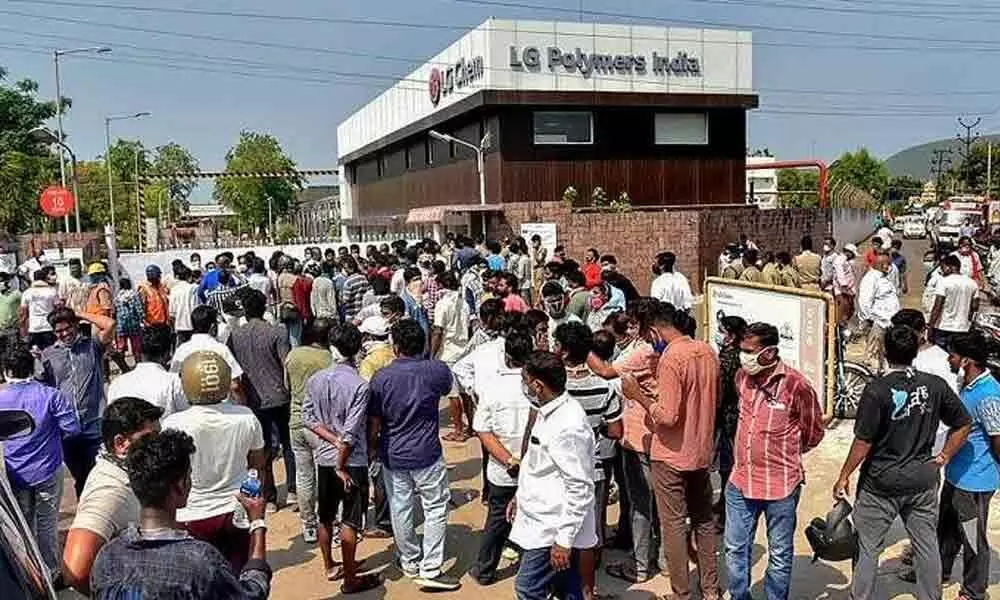The LG Polymers case is an eye-opener
 L G Polymer
L G PolymerThat the NGT finds gross negligence on the part of LG Polymers (outdated Styrene tanks, no temperature sensors and lack of training) as the chief cause of the lethal Visakhapatnam gas leak is not at all surprising! Hasn't this been the case for most of such disasters?
The Bhopal disaster bears recall. In 1982 itself(i.e. two years prior to the 1984 incident), Rajkumar Keswani, a local journalist of Bhopal, foresaw the impending catastrophe and published that American engineers from the parent branch of Union Carbide who came to audit the Bhopal plant that year, had noticed faulty safety measures and warned about it. But alas, the then Madhya Pradesh government was dismissive of the whistle-blower's solid evidence!
Also, late bureaucrat B.S.Raghavan, in his book "Human Values and Professional Ethics", tells that cost-cutting due to financial pressure and attrition resulted in a culpable failure on the part of Union Carbide to properly train the workers on safety practices and emergency action plan, which inevitably led to the disaster. Well, "indication of harm, not proof of harm, is the call to action" should be our industrial safety policy, else we will permanently keep "getting wise after the event"! More than anywhere else, it is to this area the Gita injunction "Yogah Karmasu Kaushalam", applies the most.
In other words, "achieving utmost perfection in safety management" constitutes the karma yoga for the employees of hazardous industries! This now brings us to the larger question - whether we need such hazardous industries in the first place? I gather that the company in question manufactures polystyrene, which among its many avatars, also popularly exists as "thermocol", the ubiquitous consumer packaging material! Where is this not used? From chat/pani-puri cups to automobiles, plastics, toys etc., everywhere it's used! May be insofar as industrial purposes is concerned it may be alright to some extent, but what about other things? Do we need a toxic plastic factory to make raw material for toys?
The sad irony is that just over 60kms from Visakhapatnam we have Etikoppaka village, where eco-friendly and traditional lacquer toys are fashioned by artisans, eking out meager livelihoods and languishing for want of business! And on the other hand, we have factories such as LG polymers making their polluting raw materials for plastic toys! Actually,we are all guilty of this situation! How many of us, especially the ministers of Andhra Pradesh, have really bought Etikoppaka/similar toys? After the disaster, we are outraged about toxic gases, but have we set an example(by buying eco-friendly toys like those of Etikoppaka) to entitle ourselves to express outrage? We buy our children/grand-children latest China-made plastic rubbish and pontificate on environmental pollution hypocritically at the same time!
It is because of the demand for plastic from we shameless charvakas, that industries such as LG Polymers are allowed to be set up by our respective State Governments. Another worrying thing is that such industries employ some of the best talent, like those from IITs, whose talent is ending up in serving businesses that gravely pollute the pancha-bhootas and claim the lives of people! Let it be mentioned here that, hearteningly, some automobile companies have already started experimenting and switching to non-plastic and vegan alternatives like soybeans, eucalyptus, sugarcane glycol, ground-up volcanic rock etc for parts.
And worst of all - permitting thermocol, which is made using the noxious Stryene gas, as a material fit to serve/package edible items, not giving a damn to our glorious own vistarakulu, areca leaf, bagasse etc? Where have we come to? Are we even fit to call ourselves homo sapiens, translated as the wise-man? "Unwise ape-man" would be right epithet I guess - blindly aping the West, since the dawn of our so-called Independence by successive governments and their "socialist, Gandhian, secular" ministers, that industrial development is the only way to go forward, without sparing a thought to the fact whether we really need some of them and whether we can make do with simpler alternatives!
Taking a swipe at the cancerous industrialization of the West, Gandhi observed : "This civilization is such that one has only to be patient and it will be self-destroyed.". Now, if we do not change our industrial ways, we are bound to make that warning real, quite soon! Individually, the choice is in our hands! Already, Covid has rightly given rise to the call of banning the sinful Chinese imports and embracing local ones. Hope, the change begins in earnest!
C V Krishna Manoj, Hyderabad

